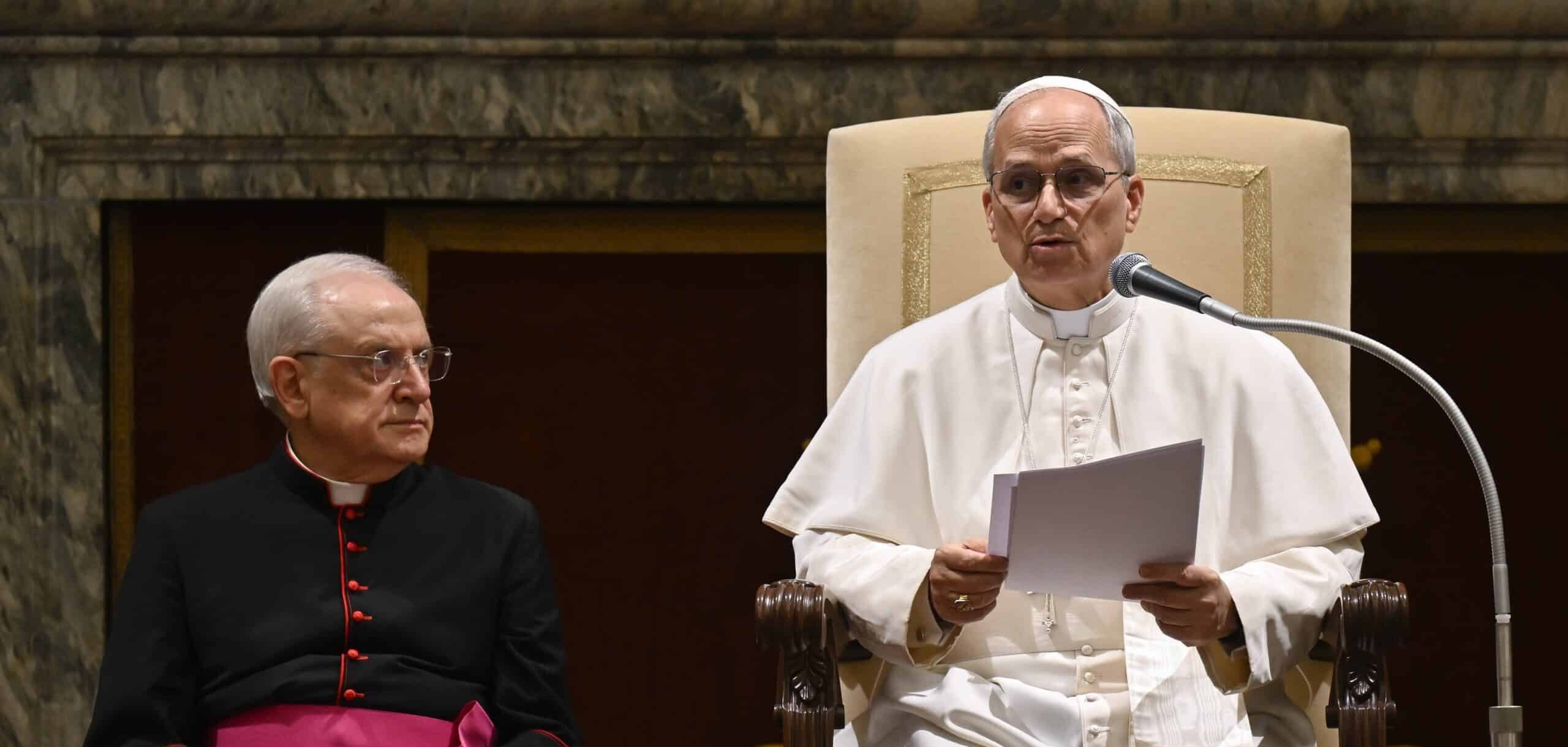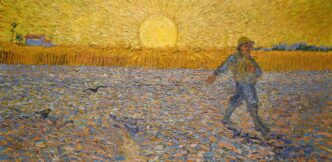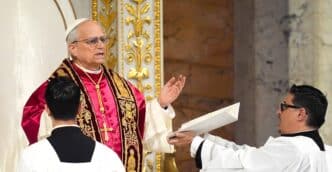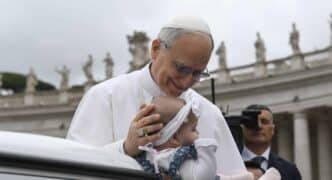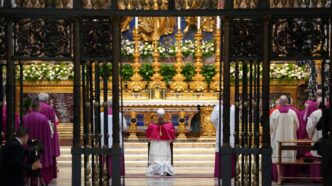“Fake quotes are easy to tweet. Truth is harder to live.” That’s not something Pope Leo XIV actually said — but you might believe it, given how many false attributions have gone viral since his election to the See of Peter. It’s ironic, or maybe prophetic, since the revolutionary moment we’re living through (which includes the rapid development of artificial intelligence) helped inspire his choice of name.
Get to know Pope Leo through this list of 10 things he’s actually said in the first days of his pontificate:
- “God loves us, God loves you all, and evil will not prevail!”
— Apostolic Blessing “Urbi et Orbi,” May 8, 2025
In a world marked by loneliness, division and spiritual confusion, this quote from Pope Leo’s first-ever speech as pope is meant to comfort, assure and invite every listener into a relationship with God.
- “Even today, there are many settings in which the Christian faith is considered absurd, meant for the weak and unintelligent. Settings where other securities are preferred, like technology, money, success, power or pleasure.”
Pope Leo is naming a common cultural attitude: that faith — especially Christian belief in God, grace and salvation — is outdated, irrational or even foolish. In many secularized societies, religious belief is dismissed as superstition or as something for the emotionally fragile or intellectually inferior.
- “Peace is built in the heart and from the heart, by eliminating pride and vindictiveness and carefully choosing our words.”
— Address to members of the diplomatic corps, May 16, 2025
Pope Leo emphasizes that peace is not merely the absence of war but a personal and interior effort. True peace begins with humility, forgiveness and mindful communication — not just political treaties.
- “Religious experience is an essential dimension of the human person. Without it, it is difficult, if not impossible, to bring about the purification of the heart necessary for building peaceful relationships.”
— Address to members of the diplomatic corps, May 16, 2025
Pope Leo defends the spiritual dimension of the human person as central to both personal growth and societal peace. He argues against secularism’s marginalization of faith from public life.
- “Many of our Eastern brothers and sisters, including some of you, have been forced to flee their homelands because of war and persecution, instability and poverty, and risk losing not only their native lands, but also, when they reach the West, their religious identity. As a result, with the passing of generations, the priceless heritage of the Eastern Churches is being lost.”
— Address to participants in the Jubilee of Oriental Churches, May 14, 2025
The pope highlights the tragic reality that many Eastern Christians have been driven from their homes by conflict, violence and economic hardship. He’s speaking especially to those from regions like Syria, Iraq, Lebanon, Ukraine and other places where Eastern Churches have long histories. These are not voluntary migrations, but displacements due to war, persecution, instability and poverty. Leaving one’s homeland is traumatic in itself. But the pope points out that migrants and refugees also risk losing something deeper: their religious identity and traditions.
- “Our neighbors are not first our enemies … but other men and women with whom we can speak.”
— Address to participants in the Jubilee of Oriental Churches, May 14, 2025
This sentence challenges the binary mindset of good versus evil that often dominates political and military rhetoric. Pope Leo calls for humanization of the other and engagement through relationship and dialogue, echoing the Gospel imperative to love one’s neighbor.
- “Let us disarm words and we will help to disarm the world.”
— Address to representatives of the media, May 12, 2025
Pope Leo XIV is urging us to recognize the power of language. Words can escalate conflict — or foster peace. By removing aggression, prejudice and hatred from our communication, we help dismantle the foundations of broader social and political violence. Peace begins with what we say and how we say it.
- “Communication is not only the transmission of information, but it is also the creation of a culture.”
— Address to representatives of the media, May 12, 2025
This profound insight elevates the role of journalists and communicators. Media doesn’t just report on reality — it shapes how we understand and inhabit the world. Pope Leo reminds us that every article, post and broadcast contributes to a broader human environment and must therefore be treated with ethical care and creative responsibility.
- “Beginning with St. Peter and up to myself, his unworthy successor, the pope has been a humble servant of God and of his brothers and sisters, and nothing more than this.”
— Address to the College of Cardinals, May 10, 2025
This statement is a powerful expression of papal humility and continuity. Pope Leo is placing himself within the long line of successors to St. Peter, the first pope, affirming that the role of the pope is not about power, prestige or personal greatness, but about service.
- “Do not be afraid! Accept the invitation of the Church and of Christ the Lord!”
These words echo the words of Jesus throughout the Gospels and have been used by popes before, especially St. John Paul II, who began his pontificate with the call, “Be not afraid!”
Pope Leo reassures those discerning a vocation — especially priesthood or religious life — that following Christ is not something to fear, even if it feels demanding or countercultural.

